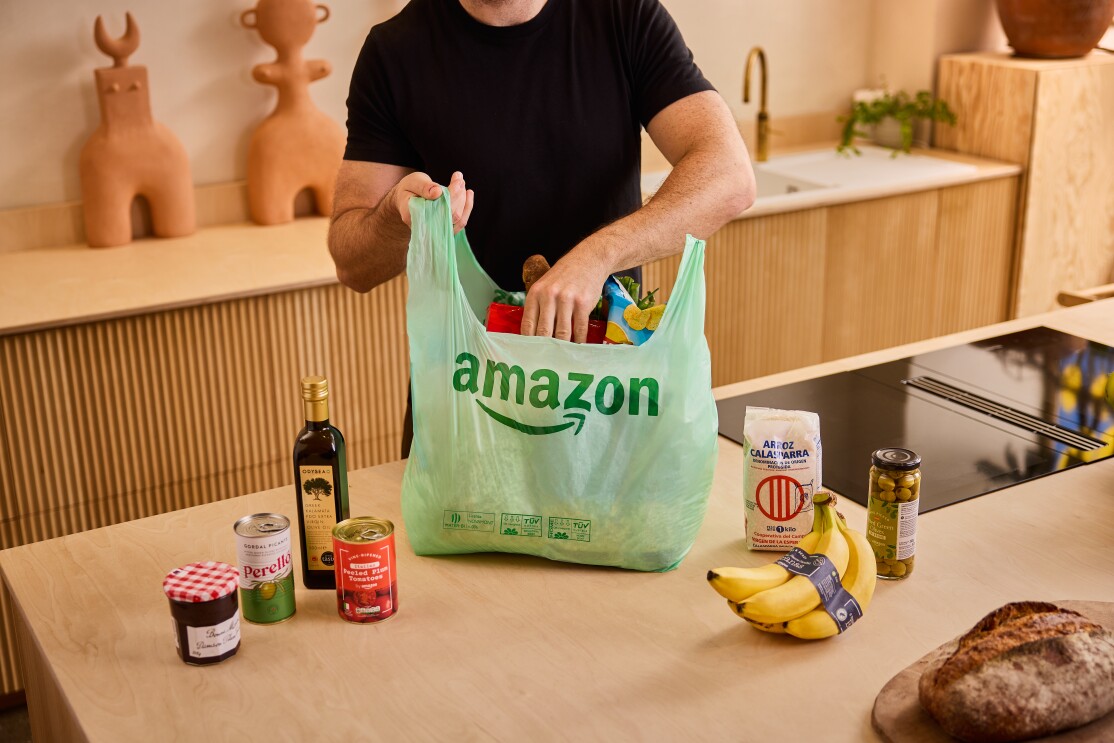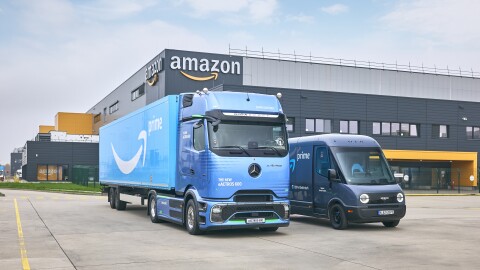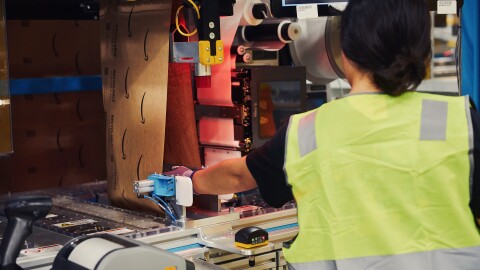Amazon is starting to pack and deliver groceries for customers in Spain using bio-based bags made from vegetable materials produced in Europe, including corn starch and vegetable oils, which can one day be recycled into new bags. The first trials of the new bags, developed by materials experts at Italian company Novamont, part of Versalis (Eni), with support from materials scientists at Amazon, are being piloted for Amazon Fresh orders in Valencia.
Food safe, strong and weather-resistant
Amazon’s bio-based bags are durable, food safe and weather-resistant. Because they are safe for food, this new material (Mater-biTM) could progressively replace fossil-based plastics used by food retailers and manufacturers. Their biodegradability also means they do not generate any microplastics.
“Our new Amazon Fresh bio-based bags provide protection against spills and condensation to keep grocery orders safe for our customers, and at the same time are less impactful for the planet because they are made from renewable, food safe materials derived from plants, like corn starch and vegetable oils,” said Alan Jacobsen, Amazon's Materials & Energy Sciences Director. “Unlike most petroleum-based plastic bags, these materials have the potential to be more efficiently recycled, while also being able to naturally degrade in a composting environment.”

Right now, Amazon Fresh bio-based material bags handed back to drivers in Valencia can be mechanically recycled – which means the material can be turned into pellets by local recycling partners, and given to Novamont to make new bags once again.
“Experimenting with Amazon is an exceptional opportunity to showcase packaging solutions made from our family of Mater-Bi materials, all of which are biodegradable and compostable, and wholly or partly derived from biomass,” said Catia Bastioli, CEO of Novamont (Versalis, Eni). “This is a unique opportunity to test their effectiveness and multiple recycling options in terms of resource regeneration and certified environmental performance."
Already, the majority (75%) of Amazon customers in Valencia who have received the bio-based bags say they are pleased with the new packaging. Respondents say they like the new bags because they are biodegradable and bio-based, or because they can reuse them for other purposes.
Amazon will use the results of this trial to assess whether these new bio-based bags can be used on a broader scale.
How Amazon is working to ‘close the loop’
In parallel to the Amazon Fresh and Novamont pilot in Valencia, Amazon’s research scientists are also working with the U.S. Department of Energy’s BOTTLE Consortium led by the National Renewable Energy Laboratory (NREL), to develop a new low-temperature recycling process to recycle bio-based, biodegradable materials.
“This process breaks down bio-based, biodegradable materials into basic building blocks that can be repolymerised back into new materials without degrading the material properties,” Jacobsen added. “Instead of only having composting as an end-of-life solution for these materials, this new process enables biodegradable plastics to be efficiently recycled, keeping these materials in use and reducing the need for additional raw materials.”
The start-up EsterCycle – which uses technology developed by NREL and Amazon - has the goal of scaling this new technology beyond the lab, enabling bio-based, biodegradable plastics to be more widely recycled.
Delivery bags today, food containers tomorrow
The next-generation of bio-based and biodegradable materials in the packaging sector, especially in the food and grocery industry, can enable a faster transition to a circular economy, helping to avoid millions of tons of plastic food and drink packaging. To improve the resource efficiency and circularity of the packaging sector, Amazon and Novamont are developing and testing various food safe bio-based solutions for advanced packaging applications, such as yoghurt cups, coffee pods and containers for fruit and meats, in a project co-financed by Circular Biobased Europe.
Packaging with a lower environmental impact
As well as developing and testing next-generation packaging which is safe and circular by design, Amazon is committed to reducing packaging wherever possible. This has resulted in more than 1 billion of our shipments since 2019 being delivered without any added delivery packaging at all in Europe through a programme called Ships In Product Packaging. Since 2015, our packaging reduction programmes have enabled us to avoid more than 3 million metric tons of packaging materials.
When additional Amazon packaging is required to ship a product, we use paper-based packaging that can be easily recycled in customers’ household recycling. In Europe, all of our delivery packaging—the boxes, bags and envelopes that we pack products in to deliver to our customers—is recyclable. This includes delivery packaging for items sold directly by Amazon, and by third-party selling partners that use Fulfilment by Amazon.












